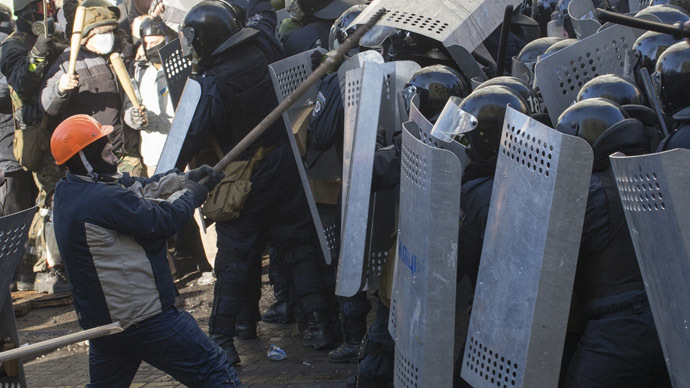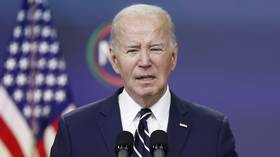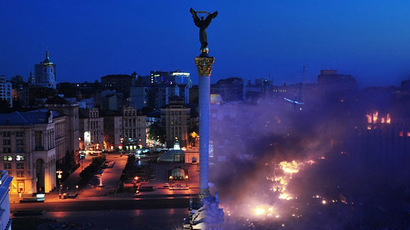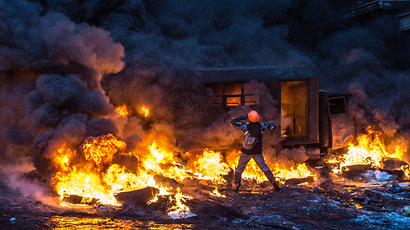Masks off: Voices from both sides of the Kiev barricades

Euromaidan is all about crowds of masked people for a Kiev resident, who grabs a camera and goes to both the protesters’ camp and the security forces’ outpost to meet real people who found themselves on opposite sides of the barricades.
Dmitry Zvershovsky, a native Kievan who lives in the Ukrainian capital with his wife and two kids, was on Maidan 10 years ago, when the so-called Orange revolution took place.
“I remember the atmosphere, the warmth people treated each other with,” he tells the RT Documentary crew, accompanying him in his quest for the true face of Ukrainian protests. “I was looking for the same people on Euromaidan, hoping to meet the same attitude, the same warmth. But for some reason, it turned out that people are getting ready to fight.”
Dmitry struggles to understand if what’s happening in Ukraine is “a black or a white page in history.” At the protesters’ camp he is confronted by the masked rally participants, who have no such doubts.

“There can’t be any dialogue between the present government and the opposition. They’ve crossed the line. No talks! They must resign. We won’t be satisfied by anything less,” one of them says.
But mostly Kiev seems to be a place of ceaseless controversy, debate and disagreement.
Dmitry comes across a heated discussion. A young man wants to know, who’s sponsoring the protesters. A woman replies that demonstrators use their own money to buy flak jackets and all kinds of protest equipment.
“I come to Maidan every day,” she says. “I leave my child with my husband and come here”.
The young man’s unconvinced.
“People who haven’t been to work for three months buy petrol for Molotov cocktails with their own money? God, how much have they saved up?”
Maidan is very heterogeneous, and its face is constantly
changing, says Vasily Stoyakin, a Kiev-based political analyst.
“On weekends, there are plenty of city dwellers, and then
Maidan looks more crowded, more sensible, and friendlier,”
he tells RT. “But on weekdays, there are Maidan protesters
for-hire from Galichina and even straight up homeless
tramps.”
Protesters can’t forgive the so-called Berkut special police forces for the violent crackdown on a rally in November. The Berkut people complain of provocations from far-right demonstrators.

“On the houses where the members of the special forces live, they paint: ‘You’re dead’ or ‘We’ll hang you and kill all your family, one by one.’ It’s not ordinary people who are gathering here,” Vladimir, a Berkut officer says.
An orthodox priest, Father Alipiy, is equally benevolent to people on both sides of the barricades, giving out blessings to all those who ask for them. He’s at the same time critical of all of the people on Maidan.
“What’s terrifying is that people are longing for war, not
for peace. They have a sick need for war,” he says.
But that’s maybe true of only the frontline crowd. Vox populi,
which Dmitry records, by interrogating numerous taxi drivers on
his way through Kiev, shows a great variety of views – from
supporting to cursing protesters, and occasionally complete
indifference to what’s going on.
While some Kievans bring food and warm clothes to protesters, others do the same for the Berkut. Despite the unit having been demonized by many, following the November violent dispersal of protesters, some of the city residents see it as the only force they can rely on for maintaining security.
Kiev might be torn between masked groups of people, defending conflicting points of view, but some of the unmasked Maidan inhabitants are clearly out there not for war, but for peace. That’s certainly true of a woman doctor, who keeps vigil in the protesters’ camp while believing there are instances, when the division into ‘us’ and ‘them’ ceases to be relevant.
“I’ll tell you something. If burning gas hits a ‘Berkut’ member and he’s in flames, and I happen to be nearby, I won’t stop for a second to think about who it is. It’s a human being burning. That’s all that matters - of course I’d run in to help him.”
For more watch RT documentary Kiev: Masks of revolution.















